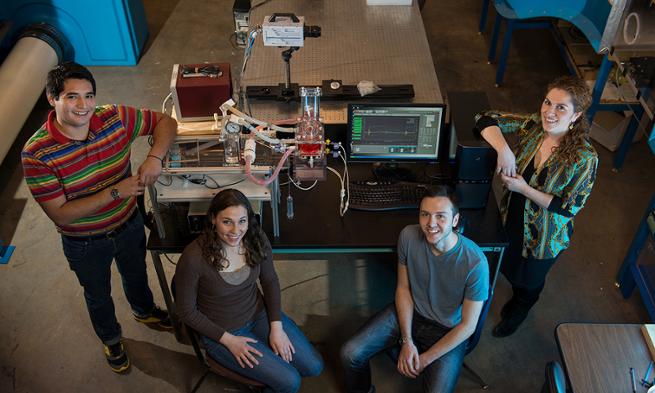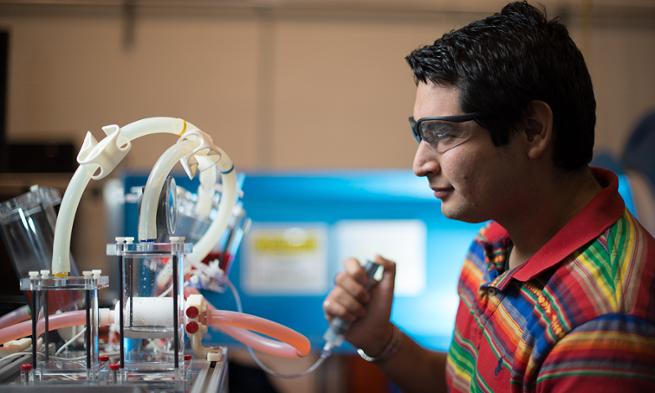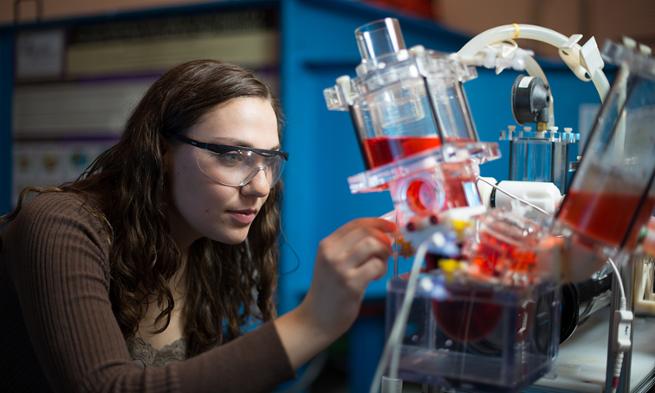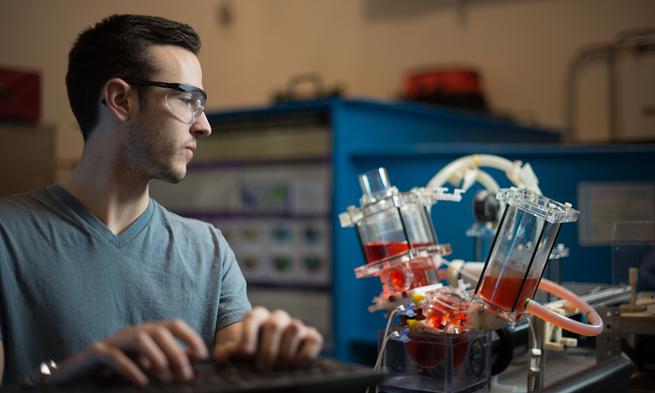Engineering health
Health and Behavior
JMU engineering students explore the future of artificial heart valves
By Courtney Herb ('15)

'My main goal is to use my engineering skills in order to help people and improve society, so I thought biomedical engineering was a great fit.'—Genna D'Antonio
The workings of the human body seem far too complex for most to ever understand, never mind improve. JMU engineering students, however, relish this sort of challenge.
Brad Weidner and Genna D’Antonio, both junior engineering majors, are using a heart simulator to determine the best artificial heart valves for various patient needs. The project, started in the spring of 2013 by JMU engineering graduate Daniel Vargas, works on replicating the functions of a human heart to collect and analyze data for real world surgical application.

Improving medical devices
'Heart valve replacement surgery affects more than 200,000 patients worldwide, so the impacts of this research are immense.'—Dr. Olga Pierrakos
“I wanted to learn more about biomedical engineering, so I looked into the different opportunities that the engineering program offered,” said D’Antonio of her initial involvement. “My main goal is to use my engineering skills in order to help people and improve society, so I thought biomedical engineering was a great fit.”
The research focuses on the application of different artificial heart valves, with a goal of improving the use of these medical devices in the future. “We’re studying vortex formation that occurs after the fluid flows over the prosthetic heart valve,” explained Weidner. “If the vortex is too strong, the blood cells get damaged and the heart has to work harder. So we’re seeing which type of prosthetic heart valve will work best. We’re either using a titled disk, which has one leaflet that opens or closes to let blood through, bi-leaflet, which has two leaflets that open like a gate, or a biological valve from a pig.”
Dr. Olga Pierrakos, associate professor for the department of engineering is the project’s faculty advisor. She believes that the work Weidner and D’Antonio are doing will have a great impact on their academic success, and on the medical community as a whole. “As engineers, such research can lead to better valve designs, but also better methods to assess valve and cardiac performance” said Pierrakos. “Heart valve replacement surgery affects more than 200,000 patients worldwide, so the impacts of this research are immense.”

Academic challenges
Having worked on the project throughout the summer and fall 2013 semester, the students find the rigor of the research brings about certain academic challenges that test their knowledge inside and out of the classroom. “The most challenging part of this research is learning all of the terminology for the biomedical field in an engineering and clinical perspective,” said D’Antonio. “We are also writing a research paper to be published in the future. Writing on such a high level can be difficult, but it has definitely helped me to improve my technical writing skills.”
'Having this experience gives me an edge as I pursue my career in the future.'—Brad Weidner
In addition to real world experience, this research opportunity allows the students to expand on and further understand the material they are learning in their engineering courses. “One of the cool things is that this work applies directly with one of the classes I’m in, Thermal Fluids,” said Weidner. “A lot of stuff that I’m learning in class can be applied to what I’m doing with the heart valve research, so it’s much easier for me to retain the information.” Student research provides participants the chance to develop their identities as being professional engineers and scientists. “For the students, the benefits go beyond simply being a line item on the resume, but extent to becoming a professional in their field” said Pierrakos, describing the advantages student researchers have upon entering their career. “Students learn what it means to conduct research, to setup an experiment, to collect data, to analyze data, to present the data in a meaningful way. For the faculty member, it is so rewarding to see the growth and development of the students, to see them gain confidence in themselves, to see them present the research and be proud of themselves.”
'Students learn what it means to conduct research, to setup an experiment, to collect data, to analyze data, to present the data in a meaningful way.'—Dr. Olga Pierrakos
Ultimately, both engineering students agree that this one of a kind research has become a vital part of their academic experience at JMU. “I am very passionate about using my engineering skills to benefit people and to make an impact on society,” said D’Antonio, who plans to pursue a master’s degree in biomedical engineering. “This is a great opportunity to fulfill my passion because the research will benefit patients by taking into account all of their personal needs in order to make the replacement more efficient and durable for the user.”
Added Weidner, “This research provides me with a lot of lab experience that I may not have gotten otherwise. Having that experience definitely gives me an edge as I pursue my career in the future.”
Learn more about the Madison Experience.
Learn more about the Department of Engineering.
